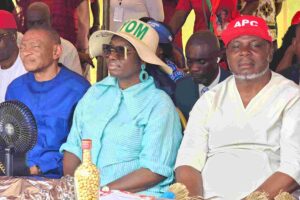As the agency dismisses the false impression that it has capacity to generate and transmit electricity

By Tony Ezike
The Enugu Electricity Distribution Company PLC (EEDC) has described the claims that the agency is involved in all levels of electricity value chain as untrue, considering that the process of power provision entails three stages namely:
- Power generation which is the prerogative of the GenCos
- Power transmission which is the responsibility of the TCN
- Power distribution which is being handled by the DisCos.
EEDC argued that since no aspect of the power provision can function effectively without the others, it would be wrong to single out and blame only the DisCos for power lapses which remains the collective responsibility of the value chain.
Below is a press statement released by the EEDC in that regards;

PRESS STATEMENT
ENSURING CLARITY: EEDC ADDRESSES MISINFORMATION AND AFFIRMS COMMITMENT TO CUSTOMERS
The attention of the Enugu Electricity Distribution Company PLC (EEDC) has been drawn to a publication which has been trending across the social media, loaded with false and unfounded information, all in a bid to smear the reputation of EEDC and pitch its esteemed customers against the organization.
Considering the weighty allegations, misleading information, and falsehood contained in this publication, we are compelled to react and set the records straight, in the interest of our esteemed customers whom we have committed to serve.
Responsibility of EEDC in the Electricity Value Chain:
EEDC is a distribution company, with license only to distribute electricity. EEDC does not generate electricity neither does it transmit electricity, but only distributes that which is generated and transmitted to it. It therefore will be unfair to blame EEDC of not “providing adequate electricity in the South East”, a situation that is totally beyond its control.
EEDC can only distribute what it gets from the national grid based on its allocation which is dependent on the total energy generated in the country. For electricity to get to customers, there are parties that need to work in synergy to see that it happens. They are referred to as the “electricity value chain” and made up of the Generation Companies (GenCos), Transmission Company of Nigeria (TCN), and the Distribution Companies (DisCos). Each has its own primary responsibility which impacts on others.
For instance, if the GenCos generate power and the TCN for some reasons is not able to wheel the power to the DisCos, there won’t be power to distribute to the customers. In the same vein, if the GenCos do not generate power, there won’t be power for the TCN to wheel to the DisCos, and there won’t be power to distribute to customers.
The unfortunate situation which has affected power supply to our customers lately is due to low power generation caused by gas constraints to the thermal generating companies, a development that has resulted in reduction in the quantum of daily megawatt hour (MWH) of energy allocated to the distribution companies nationwide.
It is important to note that this situation is not peculiar to EEDC, but one that affects all the 11 electricity distribution companies in the country, and we had consistently issued press releases and communications on the power situation to customers, explaining the reason for the drop in power supply, seeking their understanding.
Tackling the Metering and Billing Challenge:
We wish to state that EEDC is a highly regulated business enterprise and operates within the confines of the regulation guiding the industry which is overseen by the Nigerian Electricity Regulatory Commission (NERC). EEDC cannot be seen to be engaging in unprofessional conducts, else sanction will be meted on the company.
EEDC bills its customers based on services rendered, in line with the approved billing methodology. However, where there are grievances, affected customers are advised to follow the established redress mechanism which is in place (instituted by NERC), to make their complaints known to the company for necessary actions.
The metering gap is a significant concern for EEDC, recognizing the importance of metering for all customers but facing challenges in implementation due to financial constraints. EEDC has taken steps to address this, securing a loan from the CBN and contributing to the Meter Asset Fund. Additionally, franchise-based metering initiatives are underway alongside the liberalized MAP program, allowing customers to choose their meters and reimbursing them through energy usage. This program has shown effectiveness in increasing meter installations, and customer participation is encouraged.
Impact of Energy Theft and Vandalism on Service Delivery:
EEDC is aware that network issues, such as faults in transformers or power lines, can lead to service interruptions for our customers. We strongly encourage customers to report these faults as they occur, rather than attempting repairs themselves. It is EEDC’s responsibility to conduct these repairs to ensure safety and compliance with technical standards. Additionally, the rise in vandalism of EEDC infrastructure, including transformers, cables, and overhead conductors, significantly depletes our resources, leading to costly replacements and extended outages.
This is an area where community collaboration can greatly help combat this costly and wasteful scourge, which severely deteriorates the quality of our service. Similarly, rampant meter bypasses and energy theft deprive EEDC of vital resources needed for ongoing improvements in service delivery. Increased awareness and community support are crucial in mitigating these detrimental activities.
Customers who are interested in directly contributing to network improvements may also take advantage of regulations allowing Customer Investment in the network, provided they do so with EEDC’s approval and guidance.
MOU between EEDC and Anambra State:
The Memorandum of Understanding (MOU) between Anambra State and the Enugu Electricity Distribution Company (EEDC) establishes a strategic partnership aimed at enhancing electricity services through collaborative efforts and regulatory facilitation.
This agreement enables Anambra State to accelerate land acquisitions and align state approvals of EEDC’s improvement plans, enhancing infrastructure efficiency and electricity reliability. Meanwhile, EEDC’s adoption of an incentive-based franchise model aligns with both organizational and state objectives, fostering competitive service delivery with clear, accountable agreements that ensure franchisees meet key performance milestones.
This partnership significantly boosts investment security, regulatory compliance, and service quality, ultimately supporting EEDC’s vision of providing a consistent 24/7 electricity supply to its customers.
False Claim of 100 billion naira payment by Anambra State to EEDC:
In response to the misinformation circulating on social media, we would like to clarify that there has been no transaction involving the payment of over 100 billion Naira to the Enugu Electricity Distribution Company (EEDC) by the Anambra State government within the scope of the Memorandum of Understanding (MOU). Any claims suggesting otherwise are false, mischievous, and deliberately intended to mislead the public.
False Claim of Power Restriction by TCN:
Similarly, assertions regarding the Transmission Company of Nigeria (TCN) restricting EEDC’s access to its facilities due to an alleged debt of over 12 billion Naira lack merit. Such claims reflect a misunderstanding of the Nigerian Electricity Supply Industry (NESI) operations and are devoid of factual basis. We urge individuals to exercise discernment and refrain from lending credence to such unfounded allegations, which serve only to mislead and distort the truth.
For the records, EEDC has the capacity to deliver quality and reliable service to its customers, but the volume of challenges inherent in the sector has made it difficult, as all the challenges in the sector is blamed on EEDC. We urge our customers to totally disregard the falsehood contained in the publication, or such other publications, and appreciate the position of EEDC in the electricity supply chain, knowing that EEDC alone cannot ensure the delivery of quality supply to customers. It takes the whole electricity value chain to deliver on this.
The Unfair Portrayal of Sir Dr. Emeka Offor: Setting the Record Straight:
It is rather unfortunate that out of all the positive impacts Sir Dr. Emeka Offor has made globally, especially within the business landscape, philanthropy, and human capital development, the author chose to present him in the manner portrayed in the publication. What a shame!
Taking a critical look at the antecedents of Sir Dr. Emeka Offor, the testimonies of his numerous good works for his people within the South East are out there, glaring for people to see. We, therefore, urge our customers to ignore the misleading publication, which is laced with unfounded allegations, just to misinform our customers. EEDC is committed to customer service improvement, but to succeed, it needs the support of its customers. EEDC remains focused on its vision and would not allow itself to be distracted by anyone.
Signed:
MANAGEMENT
Enugu Electricity Distribution Company (EEDC)
06/05/2024




